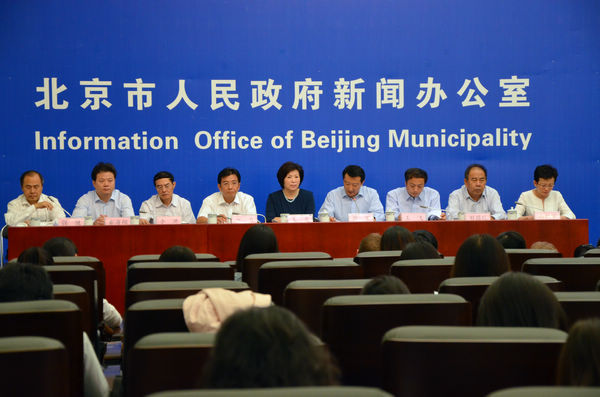Beijing resolved to curb air pollution
- By Gong Yingchun
 0 Comment(s)
0 Comment(s) Print
Print E-mail China.org.cn, September 25, 2013
E-mail China.org.cn, September 25, 2013
|
|
|
The Information Office of Beijing Municipal Government holds a press conference to introduce details of the newly unveiled Five-Year Clean Air Action Plan (2013-2017) on Monday afternoon. |
The Beijing municipal government has recently announced its Five-Year Clean Air Action Plan (2013-2017), bringing forth its most comprehensive and toughest-ever measures in a bid to fight the city’s severe air pollution.
According to the action plan, Beijing sets out to reduce particle density by 25 percent or more on the PM2.5 scale, until 2017. Air quality will hence improve significantly, with PM2.5 density controlled to some 60 micrograms per cubic meter.
The main targets of the plan are divided into 84 specific tasks, involving 42 government departments and 23 enterprises.
The PM2.5, a major pollutant in the capital city, comes from coal-burning process, vehicle and industrial emissions. Fang Li, deputy director of the Beijing Municipal Environmental Protection Bureau, explained during a press conference on Monday that the new action plan is comprised of eight emission reduction projects, as well as an additional six measures to ensure the plan’s implementation."Reducing air pollution brooks no delay, albeit a great challenge for us," Fang said.
Vehicle emission
Car emissions account for 22.2 percent of Beijing’s PM2.5 particles, according to the monitoring data released by the Beijing Municipal Environmental Protection Bureau in 2012, indicating that vehicle emission has become a major source of air pollution. As many as 22 measures in the plan are aimed to reduce car emissions in Beijing.
"The total number of vehicles in Beijing will be restricted to some 6 million by the end of 2017, with more new energy vehicles deployed annually. Moreover, Beijing will have 200,000 vehicles on its roads, powered by new and clean energy," said Rong Jun, a spokesman for the Beijing Municipal Commission of Transport.
Rong also pointed out that Beijing will continue to implement its present traffic control policies until April 10, 2014, to further ease traffic congestion and improve air quality."About 900,000 private cars were barred from driving daily in 2012, and as much as 42,000 tons of pollutant emissions were cut last year," Rong quoted from the data released by Beijing’s Environmental Protection Bureau.
Coal consumption
The new plan restricts the capital’s annual coal consumption to 10 million tons in 2017, decreasing by 13 million tons from the 2012 levels. It also aims to fully shut down all coal-burning power plants within four years. Four gas-fired thermal power centers will be built by the end of 2014.
"Reducing coal consumption by 13 million tons can be a formidable task and we have already established three institutions to guarantee [a positive outcome], including ones for the dividing and clarifying of responsibilities for different departments, plus the establishment of evaluation and accountability mechanisms," said Gao Xinyu, director of the Energy Resource Department with the Beijing Municipal Commission of Development and Reform.







Go to Forum >>0 Comment(s)